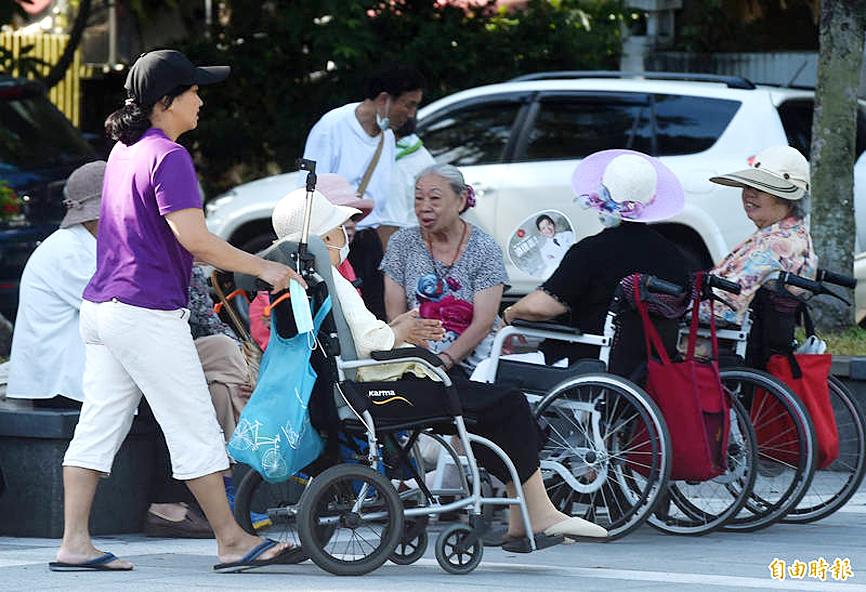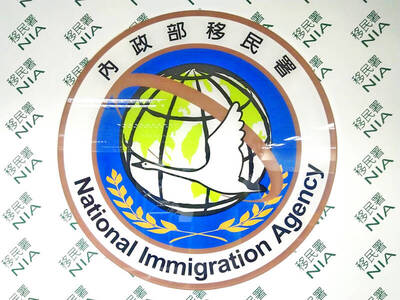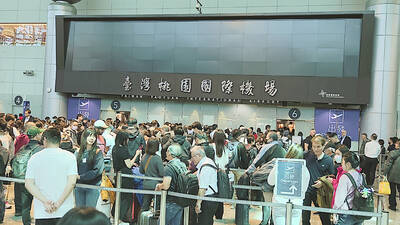Taiwan plans to raise the minimum monthly wage for live-in migrant caregivers and domestic helpers from NT$17,000 to NT$20,000, following progress in talks with Indonesia, where most of Taiwan’s caregivers originate, a labor official said on Thursday.
Indonesia last month agreed to exempt Taiwan from its zero-placement fee policy, and to resume processing applications of new caregivers to work in Taiwan after a series of talks, said Paul Su (蘇裕國), head of the Workforce Development Agency’s Cross-Border Workforce Management Division.
Indonesia in March halted Taiwan-based applications from new caregivers due to resistance from Taiwanese employers toward Indonesia’s zero-fee policy, which Su said has been introduced in Singapore and Hong Kong.

Photo: Taipei Times
Indonesia since 2000 has been pushing for foreign employers to pay workers’ placement costs, including flight tickets, passport and visa fees, and labor brokerage payments.
Ministry of Labor data as of June 30 showed that there were 218,372 migrant caregivers and domestic helpers working in Taiwan, including 164,786 from Indonesia, 27,315 from Vietnam and 25,867 from the Philippines.
The minimum monthly wage for live-in caregivers and domestic helpers is NT$17,000, lower than the national minimum wage, as such workers are not covered by the Labor Standards Act (勞動基準法).
Only the 15,530 caregivers who work at care institutions are protected by the law, and earn the national minimum wage of NT$25,250, which also covers the 468,806 migrant workers who have industrial jobs in Taiwan.
Su said the proposal to raise the minimum wage would be sent to the employment security fund management committee of the Ministry of Labor for review before the wage increase can be formally introduced.
The committee passed a resolution in early July asking the Workforce Development Agency to submit a plan for the wage increase and supplementary measures, such as subsidies for disadvantaged employers.

A magnitude 5.7 earthquake struck off Taitung County at 1:09pm today, the Central Weather Administration (CWA) said. The hypocenter was 53km northeast of Taitung County Hall at a depth of 12.5km, CWA data showed. The intensity of the quake, which gauges the actual effect of a seismic event, measured 4 in Taitung County and Hualien County on Taiwan's seven-tier intensity scale, the data showed. The quake had an intensity of 3 in Nantou County, Chiayi County, Yunlin County, Kaohsiung and Tainan, the data showed. There were no immediate reports of damage following the quake.

A BETRAYAL? It is none of the ministry’s business if those entertainers love China, but ‘you cannot agree to wipe out your own country,’ the MAC minister said Taiwanese entertainers in China would have their Taiwanese citizenship revoked if they are holding Chinese citizenship, Mainland Affairs Council (MAC) Minister Chiu Chui-cheng (邱垂正) said. Several Taiwanese entertainers, including Patty Hou (侯佩岑) and Ouyang Nana (歐陽娜娜), earlier this month on their Weibo (微博) accounts shared a picture saying that Taiwan would be “returned” to China, with tags such as “Taiwan, Province of China” or “Adhere to the ‘one China’ principle.” The MAC would investigate whether those Taiwanese entertainers have Chinese IDs and added that it would revoke their Taiwanese citizenship if they did, Chiu told the Chinese-language Liberty Times (sister paper

The Chinese wife of a Taiwanese, surnamed Liu (劉), who openly advocated for China’s use of force against Taiwan, would be forcibly deported according to the law if she has not left Taiwan by Friday, National Immigration Agency (NIA) officials said yesterday. Liu, an influencer better known by her online channel name Yaya in Taiwan (亞亞在台灣), obtained permanent residency via marriage to a Taiwanese. She has been reported for allegedly repeatedly espousing pro-unification comments on her YouTube and TikTok channels, including comments supporting China’s unification with Taiwan by force and the Chinese government’s stance that “Taiwan is an inseparable part of China.” Liu

MINOR DISRUPTION: The outage affected check-in and security screening, while passport control was done manually and runway operations continued unaffected The main departure hall and other parts of Terminal 2 at Taiwan Taoyuan International Airport lost power on Tuesday, causing confusion among passengers before electricity was fully restored more than an hour later. The outage, the cause of which is still being investigated, began at about midday and affected parts of Terminal 2, including the check-in gates, the security screening area and some duty-free shops. Parts of the terminal immediately activated backup power sources, while others remained dark until power was restored in some of the affected areas starting at 12:23pm. Power was fully restored at 1:13pm. Taoyuan International Airport Corp said in a